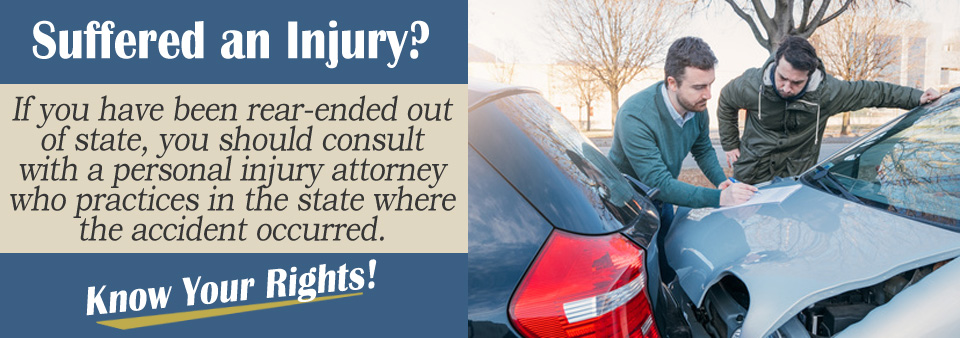If you were involved in a rear-end collision while out of state, your auto insurance coverage is still in effect. Following an out of state rear-end collision, you might be eligible to file a claim for the damages that resulted from the crash.
Laws regarding insurance coverage and auto accident fault vary significantly from one state to another.
The laws from your home state will not come into play regarding your accident claim. Instead, the laws in the state where the crash occurred will be the deciding factors. If you have any questions regarding your insurance coverage before you travel out of state, contact your auto insurance provider for clarification.
Insurance Coverage Varies Depending on State Requirements
The required insurance coverage also varies from state to state. You might live in a state that requires $50,000 of property damage coverage and $100,000 of personal injury coverage. You might have an accident in a state that requires $15,000 property damage coverage and $50,000 personal injury coverage.
In such cases, if your damage exceeds the limits of your personal insurance policy you might want to see if you can pursue a personal injury claim to make up the difference in the damages you suffered.
Some states also are no-fault states, which means regardless of which driver was to blame your own insurance covers your losses. In other states, the driver who was at-fault is liable for all the damages is the one who must pay up for any losses resulting from the crash. Your situation is dependent on the state laws where your crash happened.

Collecting Evidence for Your Claim
You need to gather documentation and preserve evidence that supports your claim. You have to show your damages and their monetary value. This means you should keep copies of any medical records, physician reports, prescription records, physical therapy notes, and medical bills.
Get written estimates for repairing your car, take photos of the damages, and keep receipts for towing, any repairs, and any rental cars. If you miss work, document time off and the value of any lost wages.
Rear-end collisions, such as rear-ended while stopped, are known for causing neck and back injuries, so you should always get checked by a medical professional following a crash. Some injuries are more serious than they initially appear or they might not even be evident at first.
Pursuing A Claim
If you have been rear-ended out of state, you should consult with a personal injury attorney who practices in the state where the car accident occurred. An auto accident injury lawyer is familiar with the laws of that state and can help you file a claim with your insurance company, or if warranted, file a personal injury claim against the other driver.
Every state has a statute of limitations which gives you a set amount of time to file a claim, if you wait too late your claim will be denied. Because auto accidents differ and because the laws do vary from state to state, the outcome can be very different.
Schedule a free case evaluation with a personal injury lawyer today.